
-
Find the right food for your petTake this quiz to see which food may be the best for your furry friend.Find the right food for your petTake this quiz to see which food may be the best for your furry friend.Health CategoryFeatured products
 Hill's Science Diet Adult Healthy Mobility Large Breed Chicken Meal, Barley & Brown Rice Recipe Dog Food
Hill's Science Diet Adult Healthy Mobility Large Breed Chicken Meal, Barley & Brown Rice Recipe Dog FoodAdvanced nutrition shown to support joint health and improve mobility
Shop Now Adult Light Large Breed Chicken Meal & Barley Recipe Dog Food
Adult Light Large Breed Chicken Meal & Barley Recipe Dog FoodFewer calories for less active large breed dogs
Shop Now Adult Large Breed Chicken & Barley Recipe Dog Food
Adult Large Breed Chicken & Barley Recipe Dog FoodSupports healthy joints, lean muscle, and beautiful coat for large breed dogs
Shop NowFeatured products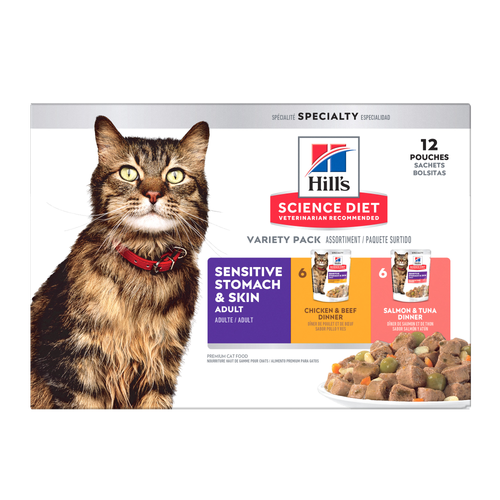 Adult Sensitive Stomach & Skin Pouch Variety 12 Pack Cat Food, Chicken & Beef, Salmon & Tuna
Adult Sensitive Stomach & Skin Pouch Variety 12 Pack Cat Food, Chicken & Beef, Salmon & TunaCarefully made, gourmet daily nutrition. Tasty chunks with Salmon & Tuna in a decadent gravy. Supports digestive health, nourishes skin and promotes a lustrous fur.
Shop Now Adult Perfect Digestion Chicken, Barley & Whole Oats Recipe Cat Food
Adult Perfect Digestion Chicken, Barley & Whole Oats Recipe Cat FoodHill's Science Diet's breakthrough nutrition supports ultimate digestive well-being & healthy microbiome
Shop Now Adult Oral Care Chicken & Brown Rice Recipe Cat Food
Adult Oral Care Chicken & Brown Rice Recipe Cat FoodClinically proven kibble technology to reduce plaque & tartar build-up
Shop Now -
DogCat
- Cat Tips & Articles
-
Health Category
- Weight
- Skin & Food Sensitivities
- Urinary
- Digestive
- Kidney
- Dental
- Serious Illness
-
Life Stage
- Kitten Nutrition
- Adult Nutrition
Featured articles Adopting a Pet: What You Need to Know
Adopting a Pet: What You Need to KnowLearn the basics of adopting a pet, including where to begin and common questions you should ask yourself when deciding which kind of pet is best for you.
Read More Cat vs. Dog: Which Is the Best Pet for Me?
Cat vs. Dog: Which Is the Best Pet for Me?Learn about important differences between dogs and cats, such as cost & space considerations. These factors can help you decide which pet is best for you.
Read More Fun Ideas for Kids and Pets This Summer
Fun Ideas for Kids and Pets This SummerOutdoor summer activities with your dog or cat can be fun for kids, too. Learn how they also teach kids responsibility & creates a bond with their pet.
Read More -


Whether due to gum disease, trauma or some other reason, many cats may need one or more teeth removed during their lifetime, requiring the need for feline dental surgery. If you are wondering what causes the need for cat teeth removal, cat tooth abscesses, or what you can expect during cat tooth extraction recovery - then read on below.
When Is Cat Tooth Extraction Is Necessary?
Periodontal disease (or gum disease) is a common cause of tooth loss in cats which includes gingivitis and periodontitis. This is caused by a buildup of plaque and tartar between the cats teeth and gums. It can cause infection and inflammation in the gums, erosion of the bone surrounding the tooth and weakening of the periodontal ligament that holds the tooth in place. Rotten, loose or wiggly teeth are painful and must be extracted. If a cat’s tooth becomes infected by dental disease an abscess can form in the gum. These are painful and filled with pus which can make eating and daily grooming for your cat difficult.
Another situation that would call for cat tooth extraction is a broken tooth. Cat teeth can break from trauma or as a result of feline odontoclastic resorptive lesions (FORLs) or tooth resorption, which is the erosion of dentin (the hard tissue below the enamel) in a tooth that becomes irreparably destroyed. FORLs cause cavities to develop that weaken a cat's teeth and causes them considerable pain. If this is the case for your feline, then extraction is the only treatment available for FORLs. The type of treatment (extraction vs crown amputation) varies based on the appearance of dental xrays taken by your vet.
Feline stomatitis is a less common but extremely painful condition of the mouth characterised by severe inflammation of the gums surrounding the teeth. The gums can appear bright red and bleed easily.The condition isn't well understood, but the cats immune system seems to play a role with a disproportionate response to the plaque bacteria. Treatment often involves a combination of medications and dental care. In advanced cases tooth extraction (sometimes whole mouth extractions) are required. Fortunately, most cats tolerate whole mouth extraction well and feel much better after cat dental surgery.
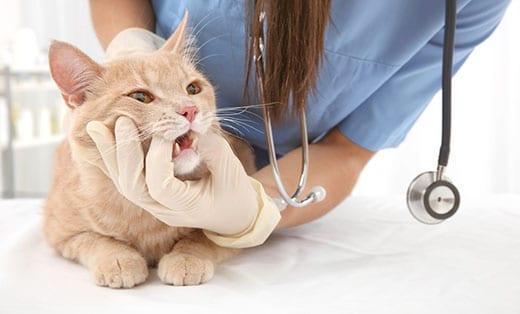


Tasty Tips
Cat Tooth Extractions: Recovery Expectations
Most cats recover quickly from a tooth extraction and generally there is no need to worry after a straightforward procedure. Your cat will probably be able to go home the same day as the procedure. However, recovery depends on your cat's overall health, how their pain is managed after the tooth removal and how they handle anaesthesia. For single extractions, recovery typically takes about one week or less. For cats that undergo multiple tooth extractions and/or have other health conditions, recovery can take a couple of weeks.
During the recovery period, the gum heals over the tooth extraction site. There are often dissolvable stitches in place that hold the gums together until they heal; these will fall out on their own.
You can help your kitty recover by feeding them canned food (this can prevent irritation to the surgery site) and by making sure they finish all pain medicine and antibiotics as prescribed. Pet parents are often surprised at how fast their feline friends recover after cat tooth extraction.
How to Reduce the Need for a Cat Tooth Extraction
If your cat has periodontal disease, brushing their teeth and making sure they have an annual dental cleaning can help prevent tooth loss.
If your cat's tooth is broken and you don't want it removed, ask your vet about the possibility of having a root canal done in order to save the tooth. Most vets in general practice do not perform this advanced procedure so ask for a referral to a veterinary dentist.
In conditions of feline stomatitis or tooth resorption, early intervention and a strong partnership with your vet can sometimes prevent the need for a cat tooth extraction — but any conditions that are painful should be treated immediately.
The Role of Nutrition is Key
Along with brushing and annual dental check ups, nutrition can also help improve your cats dental health and may reduce the chance of high cost tooth extraction and dental surgery. Hill's Prescription Diet t/d, and Hill’s Science Diet Oral Care help reduce plaque and tartar build-up with clinically proven kibble technology. The interlocking fibre technology works like a toothbrush, cleaning teeth with every bite to promote healthy gums and teeth.
If your cat suffers from stomatitis, your vet may recommend trying to feed them a limited ingredient food, to rule out the possibility of ingredient sensitivity (which is rare among cats). If your cat suffers from dental problems, ask your vet for nutritional recommendations.
Caring for a Toothless Cat
If your cat requires a full mouth tooth extraction it is important to know that your cat can still lead a happy and healthy life including the ability to be able to eat properly. Despite common misconceptions, cats without teeth can even still eat dry kibble.
It's understandable to feel nervous about your beloved cat getting dental surgery, but rest assured that most cats handle tooth extraction extremely well. Your kitty will feel much better without an achy tooth.
HIMA-SK-21194D76


One of our staff authors prepared this article for you
Related products

Clinically proven kibble technology to reduce plaque & tartar build-up

Delicious tender chicken and rice in a mouthwatering sauce with precisely balanced nutrition to support 5 essential building blocks for lifelong health

Hill's Science Diet's breakthrough nutrition supports ultimate digestive well-being & healthy microbiome

Carefully made, gourmet daily nutrition. Tasty chunks with Salmon & Tuna in a decadent gravy. Supports digestive health, nourishes skin and promotes a lustrous fur.
Related articles
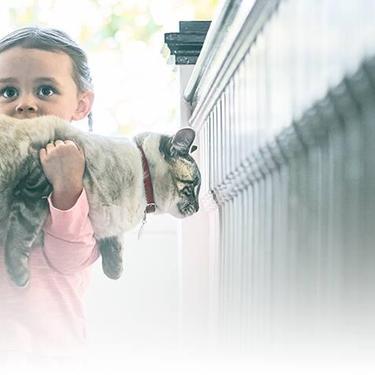
Provide the best possible treatment for cats with sensitive skin by spotting the signs, knowing the causes, and understanding the remedies. Learn more now.

Get helpful information on proper feline oral healthcare and why it's so vital to take care of your cat's teeth.
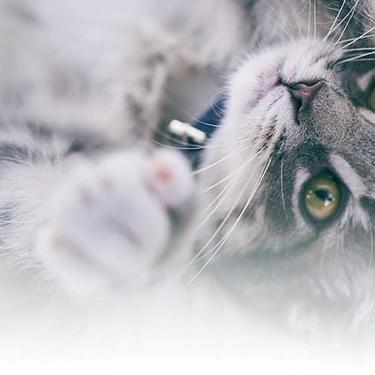
Obesity affects more than 30 percent of cats in America. Learn how you can properly feed and exercise your cat to improve its weight management.
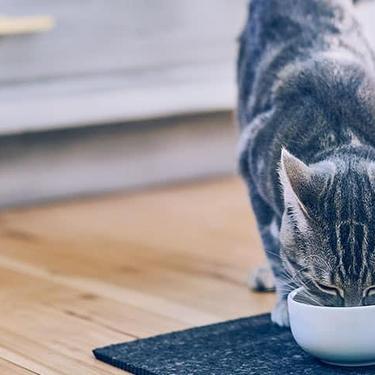
Understand the symptoms of a chronic upset stomach in your cat, and learn how to help sooth their discomfort.

Put your cat on a diet without them knowing
Our low calorie formula helps you control your cat's weight. It's packed with high-quality protein for building lean muscles, and made with purposeful ingredients for a flavorful, nutritious meal. Clinically proven antioxidants, Vitamin C+E, help promote a healthy immune system.
Put your cat on a diet without them knowing
Our low calorie formula helps you control your cat's weight. It's packed with high-quality protein for building lean muscles, and made with purposeful ingredients for a flavorful, nutritious meal. Clinically proven antioxidants, Vitamin C+E, help promote a healthy immune system.

